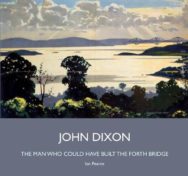
ABOUT THIS BOOK
PUBLISHER: Newcastle Libraries & Information Service
FORMAT: Hardback
ISBN: 9780951048887
RRP: £25.00
PAGES: 238
PUBLICATION DATE:
February 4, 2019
BUY THIS BOOK
As an Amazon Associate and Bookshop.org affiliate we earn from qualifying purchases.
John Dixon: The Man Who Could Have Built the Forth Bridge
Ian Pearce
John Dixon (1835-1891) was one of the generation of British contractors who built railways, bridges and other civil engineering works around the world. Today most are generally forgotten, a fate entirely undeserved by the man who erected Cleopatra’s Needle on the Thames Embankment and who built the first railway in China. John Dixon was competent and self-confident, with the boundless enthusiasm and energy typical of Victorian contractors. Had his tender for the construction of the Forth Railway Bridge been accepted, and it was the lowest tender received, history would have treated him differently.This book describes the life and works of John, his bridges, railways, jetties, seaside piers and other projects. His wider business interests, his professional colleagues and his family life are also covered. It includes an explanation of why his tender for the Forth Bridge was unsuccessful, but only mentions Cleopatra’s Needle briefly as this is worthy of another book. Indeed, John’s brothers, Sir Raylton Dixon (1838-1901) and Waynman Dixon (1845-1930) were also distinguished engineers and it is hoped to publish similar books on their careers.John, Raylton and Waynman Dixon were members of the same Dixon family, from Raby, Cockfield and Newcastle upon Tyne, as was Jeremiah Dixon of Mason-Dixon Line fame.
Ian Pearce
Dr Ian David Pearce CEng, MIMechEWith a background as a professional engineer and an amateur historian, Ian has been able to bring a unique perspective to understanding the lives and works of the Dixon engineering brothers, John, Raylton and Waynman.Ian’s engineering career went from working on the shop floor at Aveling-Barford in Grantham building road rollers and dumper trucks to being a senior manager with Imperial Chemical Industries on Teesside, with a degree and fluid mechanics research at Nottingham University in between. He then spent time in Eastern Europe after the fall of communism promoting enterprise with Durham University Business School. After some years as a self-employed management consultant, Ian turned to history in retirement. He has run the Great Ayton History Society for the past fifteen years, personally carrying out research into village industries and families.









